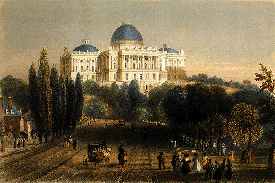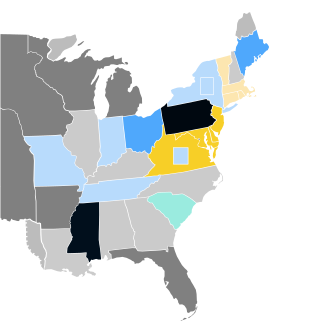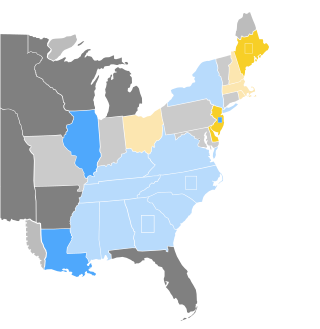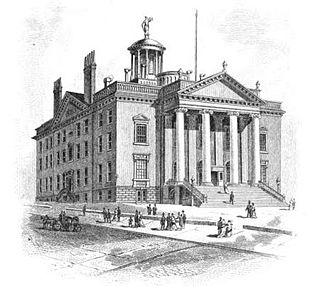
The 1832 United States presidential election was the 12th quadrennial presidential election, held from Friday, November 2 to Wednesday, December 5, 1832. Incumbent president Andrew Jackson, candidate of the Democratic Party, defeated Henry Clay, candidate of the National Republican Party.

The 20th United States Congress was a meeting of the legislative branch of the United States federal government, consisting of the United States Senate and the United States House of Representatives. It met in Washington, D.C. from March 4, 1827, to March 4, 1829, during the third and fourth years of John Quincy Adams's presidency. The apportionment of seats in the House of Representatives was based on the 1820 United States census. Both chambers had a Jacksonian majority.

George Wolf was the seventh governor of Pennsylvania from 1829 to 1835. On June 29, 1888, he was recognized as the "father of the public-school system" in Pennsylvania by the erection of a memorial gateway at Easton.

The 1828–29 United States House of Representatives elections were held on various dates in various states between July 9, 1828 and October 5, 1829. Each state set its own date for its elections to the House of Representatives before the first session of the 21st United States Congress convened on December 7, 1829. Elections were held for all 213 seats, representing 24 states.

The 1829 United States Senate special election in New York was held on January 15, 1829, by the New York State Legislature to elect a U.S. Senator to represent the State of New York in the United States Senate.

The 1833 United States Senate election in New York was held on February 5, 1833 by the New York State Legislature. Interim Senator Charles E. Dudley was not put forward for re-election to a full term. Jacksonian Nathaniel P. Tallmadge was elected to succeed him after narrowly winning a Jacksonian legislative caucus over Benjamin F. Butler. He then narrowly won majorities in both houses of the legislature.

The 1834–35 United States Senate elections were held on various dates in various states. As these U.S. Senate elections were prior to the ratification of the Seventeenth Amendment in 1913, senators were chosen by state legislatures. Senators were elected over a wide range of time throughout 1834 and 1835, and a seat may have been filled months late or remained vacant due to legislative deadlock. In these elections, terms were up for the senators in Class 2.

The 1832–33 United States Senate elections were held on various dates in various states. As these U.S. Senate elections were prior to the ratification of the Seventeenth Amendment in 1913, senators were chosen by state legislatures. Senators were elected over a wide range of time throughout 1832 and 1833, and a seat may have been filled months late or remained vacant due to legislative deadlock. In these elections, terms were up for the senators in Class 1.

The 1830–31 United States Senate elections were held on various dates in various states. As these U.S. Senate elections were prior to the ratification of the Seventeenth Amendment in 1913, senators were chosen by state legislatures. Senators were elected over a wide range of time throughout 1830 and 1831, and a seat may have been filled months late or remained vacant due to legislative deadlock. In these elections, terms were up for the senators in Class 3.

the 1828–29 United States Senate elections were held on various dates in various states. As these United States Senate elections were prior to the ratification of the 17th Amendment to the United States Constitution in 1913, senators were chosen by State legislature United States. Senators were elected over a wide range of time throughout 1828 and 1829, and a seat may have been filled months late or remained vacant due to legislative deadlock. In these elections, terms were up for the senators in Class 2.

The 1821 United States House of Representatives elections in New York were held from April 24 to 26, 1821, to elect 27 U.S. Representatives to represent the State of New York in the United States House of Representatives of the 17th United States Congress.

The 1826 United States House of Representatives elections in New York were held from November 6 to 8, 1826, to elect 34 U.S. Representatives to represent the State of New York in the United States House of Representatives of the 20th United States Congress.

Elections to the United States House of Representatives were held in Pennsylvania on October 9, 1798, for the 6th Congress.

Elections to the United States House of Representatives were held in Pennsylvania on October 11, 1808, for the 11th Congress.

The 51st New York State Legislature, consisting of the New York State Senate and the New York State Assembly, met from January 1 to December 10, 1828, during the fourth year of DeWitt Clinton's second tenure as Governor of New York, and—after Clinton's death—while Nathaniel Pitcher was Governor, in Albany.

The 52nd New York State Legislature, consisting of the New York State Senate and the New York State Assembly, met from January 6 to May 5, 1829, during the short tenure of Martin Van Buren as Governor of New York, and—after Van Buren's resignation—during the first year of Enos T. Throop's governorship, in Albany.

The 53rd New York State Legislature, consisting of the New York State Senate and the New York State Assembly, met from January 5 to April 20, 1830, during the second year of Enos T. Throop's governorship, in Albany.

The 56th New York State Legislature, consisting of the New York State Senate and the New York State Assembly, met from January 1 to April 30, 1833, during the first year of William L. Marcy's governorship, in Albany.

A special election was held in Pennsylvania's 8th congressional district on October 13, 1829 to fill two vacancies in Pennsylvania's congressional delegation before the first session of the 21st Congress.

On December 15, 1829, a special election was held in Pennsylvania's 16th congressional district to fill a vacancy caused by the resignation of Representative-elect William Wilkins (AM) on November 9, 1829, prior to the start of the 21st Congress.










